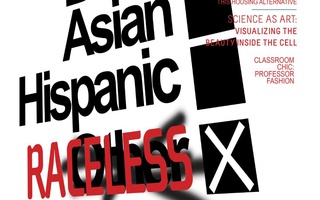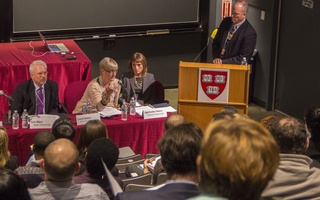To the editor:
As a race transcender and a researcher exploring the factors that lead to this identity disposition, I wish to offer some clarification and a caution to Camille S. Owens ’13 and Carolyn W. Chou ’13, the authors of “Resisting Racelesness,” a letter in response to the article “Raceless Like Me” and others who might have had similar reactions to learning about this identity orientation.
Race transcendence is no more a theory than is race. We may and should develop theories about the phenomenon of racial identity, but that is quite apart from acknowledging the existence of any particular orientation toward racial identity. To be “concerned by the implications of presenting race transcendence as a viable theory for reconfiguring identity” is simply to misconstrue an identity as a theory of identity. We would not say that the authors’ self-description as two women of color is a theory to be accepted or disputed. It is a statement of a disposition about an aspect of their identity, and they are entitled to present it—but no more so than is someone who is race transcendent.
Regarding the question of whether one can think beyond the boundaries of race, I assure the reader that I have done so from the moment I was presented with the absurdity of the idea of race, and I am documenting the narratives of others who also think beyond the real constraints of this false construct. I am quite aware that my inability to accept a specious concept as legitimate is fully matched by the inability of some to see the concept as specious, illegitimate, and, at least cognitively, optional.
The authors are quite right that race is about more than subscription. It is indeed initially and primarily about assignation. The construct of race functions like Jeremy Bentham’s Panopticon, performing the diabolical trick of leading the policed to police themselves. So powerful is racialization that we not only accept but also embrace our incarceration, unable to imagine a reality beyond our skin cells.
Regarding the practical implications of having a non-racialized sense of self, the authors raise some important questions. “How does a person who is perceived as non-white but who identifies as raceless deal with racism in their personal life?” And “…how can one be embedded within a system and simultaneously above it?” If these are questions based in genuine scientific curiosity, they can be pursued with interest and even excitement. If they are, on the other hand, queries conveying invalidation of a harmless worldview, then they represent, no matter how politely presented, a soft form of bigotry.
The fact is that there are people who reject the notion of race and racial identity. You might not be raceless, like me, but please do not tell those of us who hold this identity orientation that we cannot exist. We’re here (if rare); get used to it.
Carlos Hoyt is an Associate Dean of Students and Psychological Counselor at Phillips Academy Andover. He is currently pursuing his PhD at Simmons College. He is the founder of the website racetranscenders.com.
Read more in Opinion
Reclaiming Love From MarriageRecommended Articles
-
 Raceless Like Me
Raceless Like Me -
Resisting RacelessnessRace is not a question of personal identification, even for people whose physical appearance makes checking a box difficult.
-
Strong Showing for Cross Country at Paul Short InviteA week after duking it out with some of the top teams in the nation at the Battle for Beantown, the Harvard men and women’s cross country teams traveled to Lehigh University to participate in the Paul Short Invitational.
-
Strong Showing for Women's Crew at Head of HousatonicThe team placed three boats in the top 10 of the varsity eight race and four in the top 10 of the varsity four race.
-
 Harvard Today: October 14, 2014
Harvard Today: October 14, 2014 -
 Women's Crew Strokes Toward Spring
Women's Crew Strokes Toward Spring













